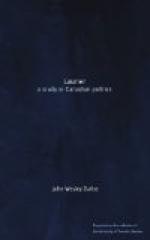SUPREME IN QUEBEC
The second issue which appeared for a moment to put Laurier’s grip on Quebec in peril was the South African war. Looking back twenty-three years it is pretty clear that Laurier’s position at the outbreak of the war, that the Canadian parliament should be consulted as to the sending of a contingent, was wholly reasonable. Those were the days of heady Imperialism in the English provinces; and, vigorously stirred up by Laurier’s party foes for political purposes, it struck out with a violence which threatened to bring serious political consequences in its train. Tarte was credited with having declared publicly in the Russell House rotunda: “Not a man nor a cent for South Africa,” which did not help matters. The storm was so instant and threatening that Laurier and his colleagues bowed before it. By order-in-council Canada authorized the sending of a contingent. Other contingents followed, and Canada took part in the war on terms of limited liability which were agreeable to both the British and Canadian governments.
The South African war was most unpopular with the French-Canadians, but the unpopularity did not extend to Laurier. They agreed in theory with Bourassa but they recognized that Laurier had yielded to force majeure. Indeed the very violence with which Laurier was assailed in Ontario strengthened his hold in Quebec. It is not easy for a proud people to stomach insults such as, for instance, the remark in the Toronto News, that the English-Canadians would find some way of “emancipating themselves from the dominance of an inferior people whom peculiar circumstances had placed in authority in the Dominion.” The election of 1900 gave Laurier fifty-eight supporters in the province of Quebec out of a total of sixty-five seats. The Rouge-Bleu coalition had not come off officially, Chapleau’s death in 1898 having removed the necessity of formally recognizing his services, but the coalition of Bleu and Rouge elements had taken place; and it held so firmly that when some of the architects of the fusion tried later to undo their work they found this could not be done. Dansereau was the first to go. Mr. Mulock, the postmaster-general, entirely oblivious of the fact that Dansereau was one of the main wheels in the Quebec machine and seeing in him only an entirely incapable postmaster, fired him in 1899 with as little hesitation as a section boss would show in bouncing an incompetent navvy. Tarte and Laurier tried to patch up the quarrel, but Dansereau preferred to return to journalism as editor of an independent journal whose traditions were Conservative. He was to be, five years later, one of the leaders in that curious conspiracy, the MacKenzie-Mann-Berthiaume-La Presse deal—the details of which as told by Professor Skelton read like a detective yarn—which was turned into opera bouffe by Laurier’s decisive and timely interference. In 1902, Tarte, in Laurier’s absence and in the belief that he could not resume the premiership on account of illness, attempted to seize the successorship by pre-emption, and was promptly dismissed from office by Laurier. Tarte and Dansereau tried to rally the Bleu forces against Laurier, but these were no longer distinguishable from the Liberal hosts into which they had merged. Their day was over and their power gone. Laurier reigned supreme.




